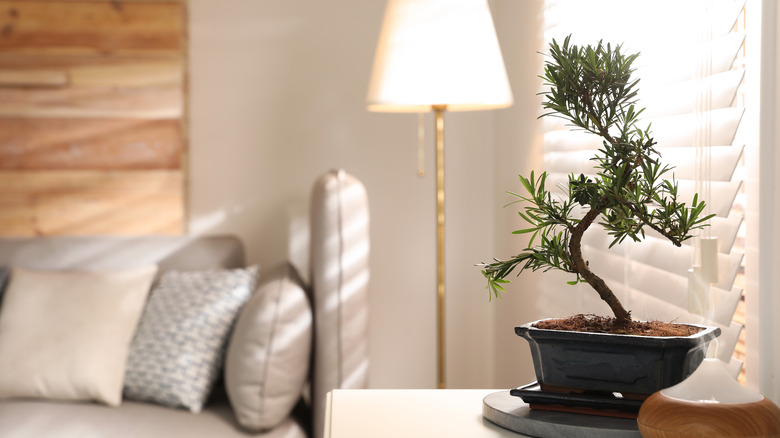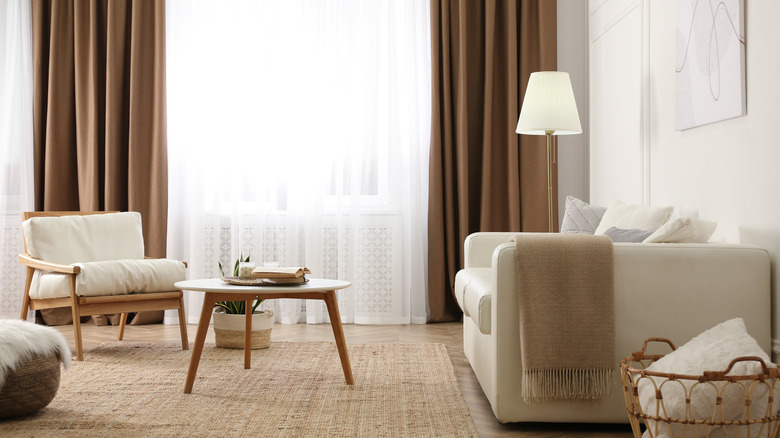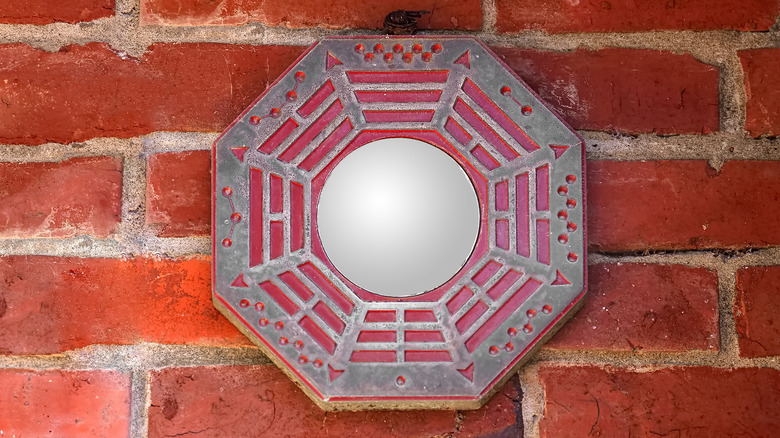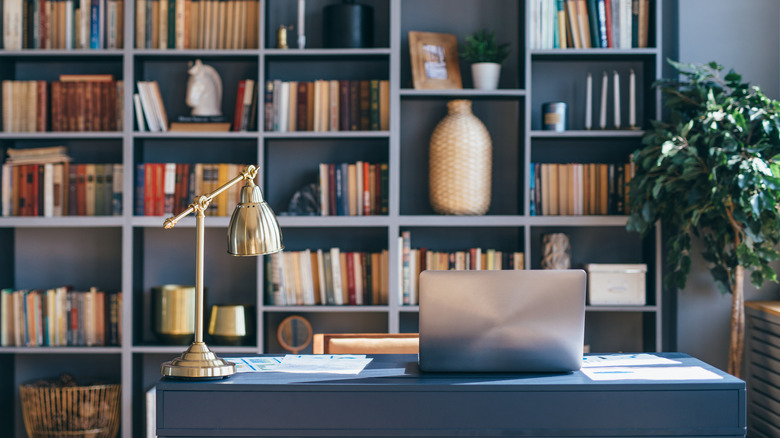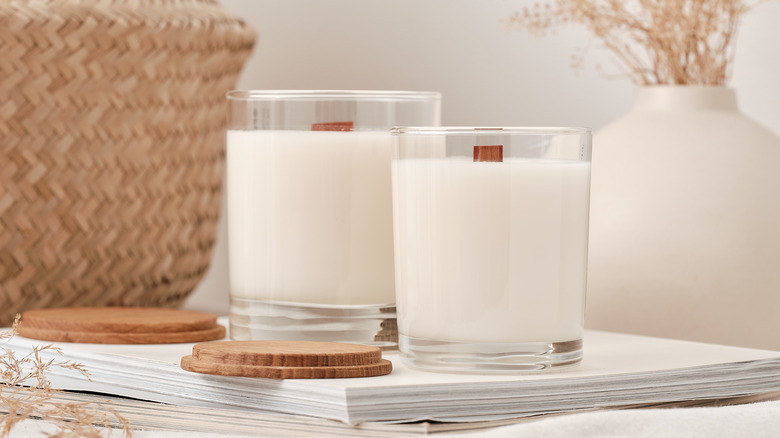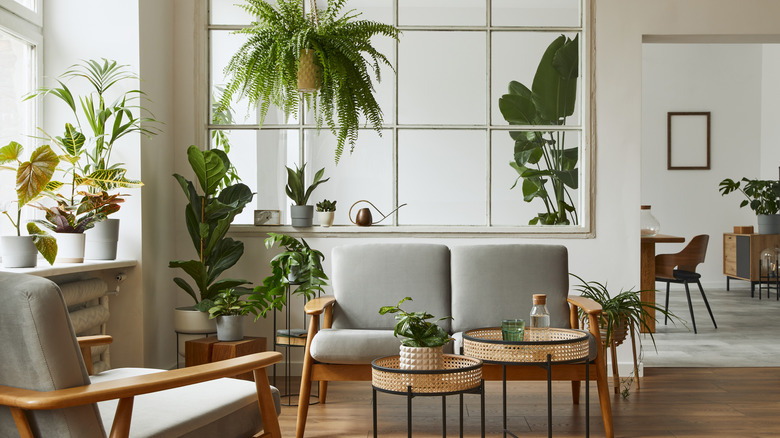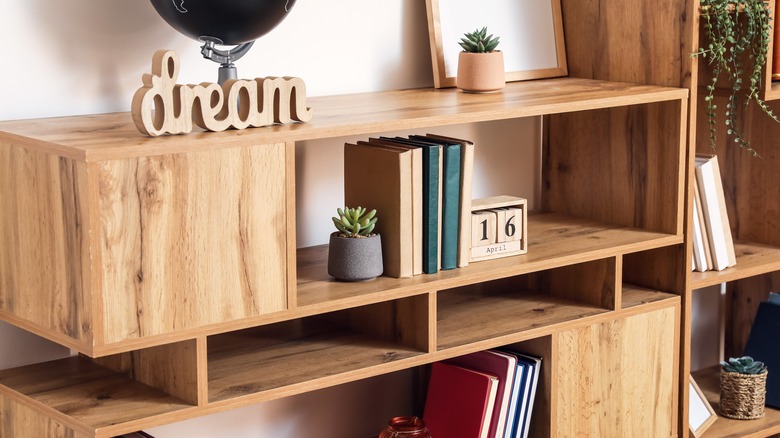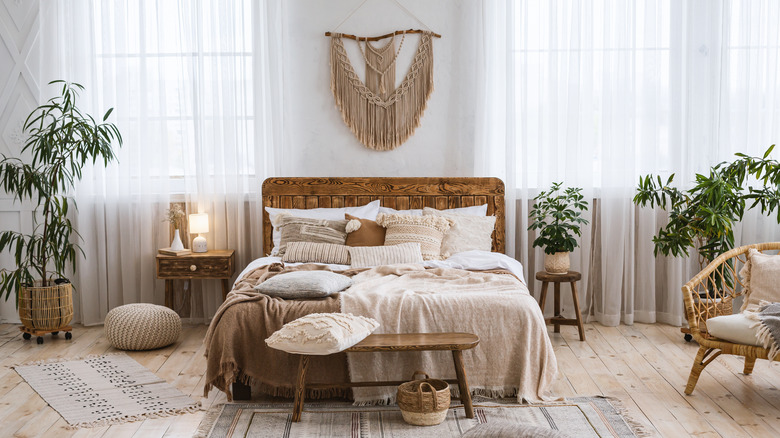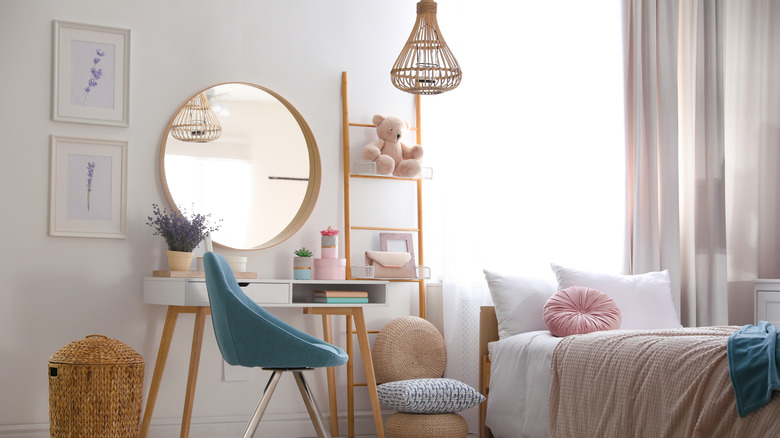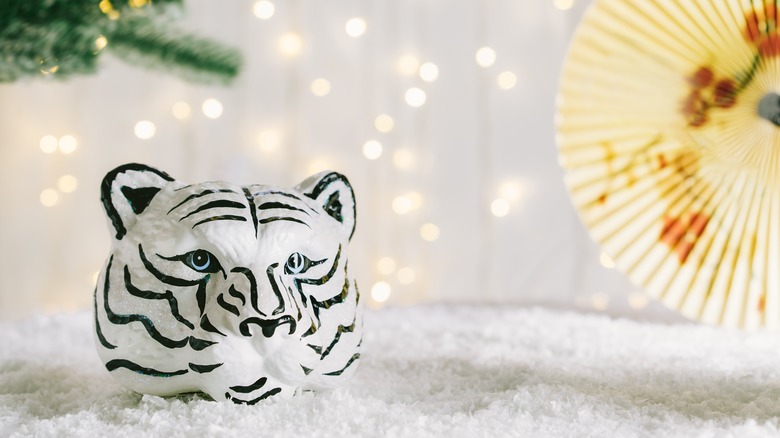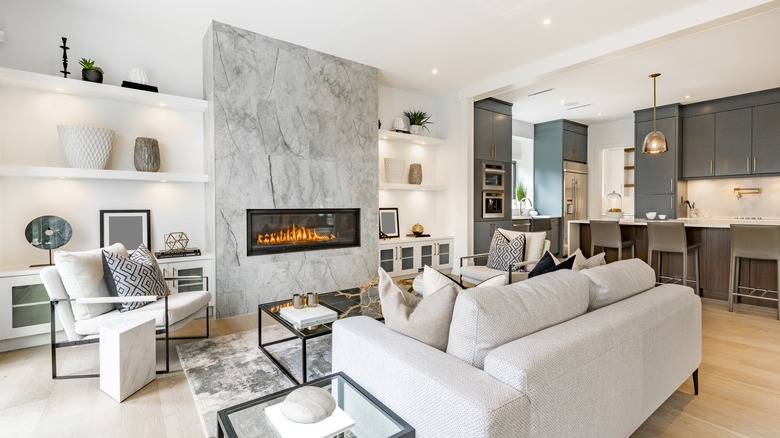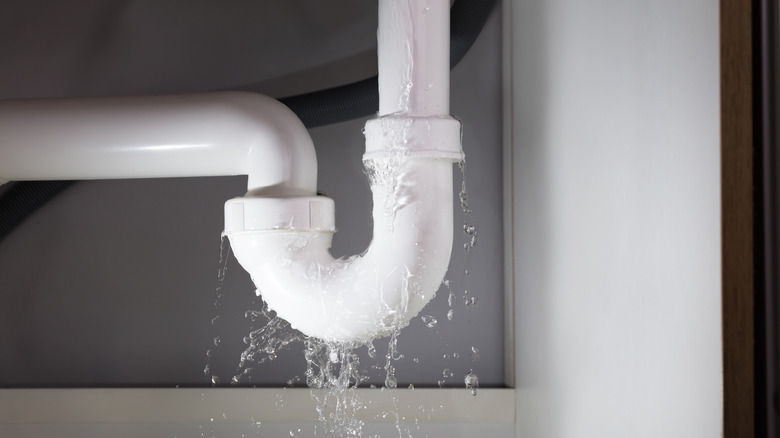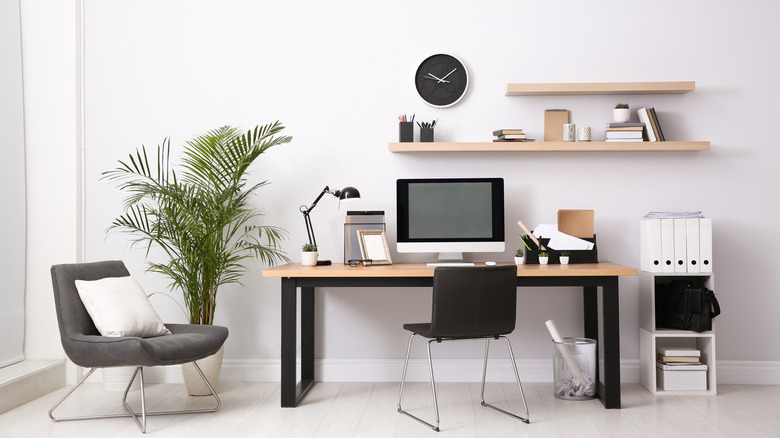How To Bring Good Vibes Into Your Home Using Feng Shui
Almost everyone wants better relationships, health, and wealth. While it may not seem like the interior design of your home impacts these things, feng shui says otherwise. According to The Spruce, the words "feng" and "shui" translate as "wind" and "water." Together, they mean "the way of the wind and water."
The origins of feng shui date back to the Neolithic period in China, over 6000 years ago (via Feng Shui Living). Originally the term was "kan yu," which translates to "observe the ways of heaven and investigate the ways of earth." During this time, feng shui was about protecting the land from enemies and harmful conditions. Feng shui experts were skilled at understanding natural forces and how humans connect to their space. In modern-day design, feng shui is both an art and a science, focusing on how our environment impacts our overall well-being. Feng shui considers how layout, colors, natural elements, light, and functionality help shape our moods, health, relationships, and desired prosperity. Here are the best ways to bring good vibes into your home with feng shui tips.
Understand the chi in your space
Feng shui stems from how cosmic energy, "chi," moves throughout a space. According to Morris Feng Shui, chi is the "breath of cosmic life" and can be used interchangeably with ki, prana, pneuma, or aether. Balanced chi follows the yin yang philosophy, and it can only be complete when both opposite energies are in balance, allowing harmony to flow through the space (via Love to Know). Yin is the feminine energy that focuses on nurturing and giving, while yang energy is the masculine energy that drives creation.
Forms of chi in interior design include sheng chi, positive energy, and shi chi, negative energy. The word "sheng" translates to the energy that moves upward. In a home, this energy creates a peaceful feeling. Shi is decaying energy, the opposite of sheng energy. Things that bring on shi energy include clutter, cobwebs, and dust. For centuries, the Chinese believed that invisible forces work around us. Later, they understood that these forces corresponded with Earth's magnetic forces.
Consult a Bagua map
When looking to add feng shui and implement it in your home, the first step is to consult a Bagua map, sometimes called a Bagua grid. According to The Spruce, Bagua is an energy map on your home floor plan. The Bagua has nine distinct areas that represent different life circumstances. These are wealth/prosperity, fame/reputation, relationships/love, family, health, children/creativity, knowledge/self-cultivation, career, and travel/helpful people (via Astrostyle). Each Bagua is associated with different colors, textures, and natural elements.
Practitioners use a compass to determine the layout of your home's Bagua grid, using the front door as an anchor point. Baguas are for the entire floorplan layout, but they can also be done room by room. To map out your Bagua grid, outline the space you want to grid, measuring each wall. Next, using a compass facing away from the entrance, divide the room into nine squares. Then label each square with the corresponding Bagua element. The north part of the Bagua grid should be the career element, no matter what the compass says. To activate the Bagua element, add an element of color belonging to the Bagua into the square. This step can be as simple as adding a wood picture frame to the family Bagua or considering a yellow rug in the health Bagua space.
Focus around the command position
The command point in feng shui is where all of your energy stems. In modern interior design, this is called the focal point. According to MindBodyGreen, the command position is used in bedrooms or offices to indicate the correct placement of your bed or desk. Ideally, it is the position farthest from the door, against a stable wall, that looks toward the door. As architect and certified feng shui consultant Anjie Cho said in a conversation with MindBodyGreen, "When you can see it, you're open to all the opportunities and energy coming toward you. When you can't, you're looking away from your future and inadvertently looking backward."
Command positions are ideal places to put a bed, sofa, or desk (via Doorflip). If the command position does not fit into a space, it does not mean that someone is cursed or unlucky. There are many ways to offset the interruption of sheng chi.
Build a welcoming entrance
In feng shui, chi enters through the front door and flows through a home. According to The Spruce, some houses have a secondary door used for everyday entry, which is not part of feng shui purposes. To welcome abundance into your space, focus on your front door. Ideally, it should be proportional to the rest of the house and bigger than other doors in the home (via Feng Shui Nexus). It is also essential to properly maintain your front door and keep the hinges functioning.
Since the entryway of a home sets the atmosphere for the entire space, it's a good idea to keep your entrance area clutter-free (via MyDomaine). Organizational systems, baskets, or hooks can help achieve a clean look while remaining functional. Avoid dead plants, which bring negative energy, and focus on decorating with round-leaved plants. Also, do not hang a mirror in an entryway. The chi can bounce off the mirror and go back outside. Need to hang up a mirror? Place it perpendicular to the door.
Remove clutter
In feng shui, clutter represents stagnant energy, which results in a lack of harmony in our homes. According to Mia Danielle, clutter encourages blocked energy and prevents the chi from moving through living spaces. When removing clutter from your home, assess if an item is purposeful or purely decorative in function. Consider your relationship to the object, how much space it takes up, and if it's difficult to clean.
It's not just feng shui that claims clutter harbors negative energy. Neuroscientists at Princeton discovered that clutter acts as a visual stimulus and limits our processing capacities, making us easily distracted and fatigued (via Feng Shui Nexus). Cluttered spaces can increase stress, depression, and feelings of guilt. When organizing a room to help chi flow, focus on the function of the space (via Kiki Interiors). For example, there is no value in storing shoes in the bathroom when you have an entryway.
Plan out your colors
While a Bagua is typically used to plan out the quadrants of a space and different energy activations, it can also help map out colors. According to Love to Know, feng shui helps decide the color of a front door based on the direction the house is facing. In feng shui, every direction on a compass has a specific element and color. Additionally, the house's material can influence the entryway color.
Consult feng shui philosophy when picking the color of a room. First and foremost, your living space should be a color that sparks joy and reminds you of positive experiences (via The Spruce). Choose the color of a room based on the placement of the Bagua grid or the Bagua element you want to activate. For example, if you wish to improve the quality of your relationships, paint your bedroom a soft pink or in shades of peach.
Incorporate the five elements into your home
The five elements play an essential role in feng shui. The elements include wood, fire, earth, metal, and water. Balancing these in your home will promote harmony. According to HGTV, each element has the power to inspire different traits. For example, wood helps increase creativity and intuition. However, having too much wood in a space can encourage depression and ambivalence. Decorating with fire elements, like candles or shades of red and pink, can help boost enthusiasm and leadership skills.
When you have too much fire in a space, it can increase impulsive behavior and anger. Playing with earth elements is believed to increase physical strength and grounding. However, too much earth can cause boredom. Incorporating metal into your living space boosts mental clarity, but too much metal can make us overcritical. Adding water elements like the color black or mirrored surfaces is believed to connect us to our insight. However, too much water may make us feel like we're drowning in emotions.
Add plants to your design
In feng shui, plants activate the wood element and represent life and rejuvenation. According to The Spruce, incorporating plants can increase compassion and kindness. The best way to decorate with plants is to consult the Bagua grid and match the placement with your intentions. For example, a plant in the wealth quadrant can encourage abundance to grow, while a plant in the children's square will encourage the growth of offspring and projects. While all plants serve a purpose in feng shui, attacking energy comes from sharp objects and spiky plants, like cactus. Additionally, fake plants are generally avoided in feng shui because it's challenging to find an authentic-looking fake.
Caring for a plant is a great way to boost our chi and help us feel more grounded (via MyDomaine). While the type of plant doesn't always matter in feng shui, there are a few recommended plants. For example, citrus trees welcome abundance and luck because of their ability to provide fruit. Orchids are also a favorite in feng shui design because they symbolize fertility and creativity. You can also think about designing a feng shui garden in your outdoor space.
Focus on accessories that bring you joy
While many people may think feng shui has too many rules and exceptions to the rules, much of the design philosophy draws inspiration from joy. In feng shui, items that inspire joy are "happy anchors." You should to fill your living space with them. According to peace.love.feng shui, when we decorate and remove clutter, it's essential to keep items you love and get rid of items that hinder your happiness or progress. Additionally, it's good to incorporate art work and pieces that you love since this will help make you more calm and bring an energetic vibe into the room.
We experience our environment through our senses. A comfortable living space will meet all of our sensory needs, making it easier to enjoy the space you call home (via Apartment Therapy). Additionally, furnishings and colors can carry mental associations that are either good or bad. Playing with colors can boost our mood and make us feel more at home.
Ensure your bed is in the command position
Are you deciding where to place a bed in your bedroom? Avoid putting it next to an unstable wall or under a window. According to The Spruce, your bed should rest in the command position. The bed in feng shui represents its owner because you spend so much time there. Feng shui believes placing the bed in the command position allows good chi to come directly at you. Having a bed rest next to a solid wall will help you feel more secure while sleeping.
If you can't put your bed in the power position, add a mirror so you can see the door while sitting in bed. When placing a bed against a solid wall, ensure you have space on both sides to create balanced yin yang energy. The bed should not share a wall with a bathroom, which can harbor negative energy.
Use mirrors in your design
Want to feng shui your living room or a bedroom? Consider decorating with mirrors. Mirrors are a staple in feng shui-friendly decor because they can shift chi and prevent it from leaving a space. According to The Spruce, mirrors represent the water element and can promote wisdom. When placing a mirror near a door or window, it can take on the element in its reflection. For example, if a mirror reflects a tree from the outside, it brings wood elements inside your space.
While mirrors have many benefits, it's essential in feng shui to avoid broken, cloudy, or distorted mirrors. Avoid sharp edges, which are often called the arrow of poison. An arrow of poison is any sharp object or corner pointing towards the main door, someone's body, or inside the home. These are dangerous because they can hurt someone when they walk by, and many believe leaving these in a space can encourage loss of job or health (via Red Lotus Letter).
Cleanse negative energy by getting rid of old objects
According to The Spruce, in feng shui, it's essential to remove negative items and add pieces we love. Ideally, you want to fill a space with a joyful energy that makes you feel vibrant while avoiding negative or stagnant energy. You can achieve this by removing objects that remind us of bad memories or photos that you do not enjoy, even if you feel obligated to display them. Since items hold energy and can block our path forward, it's good to keep changing our decor and remove clutter as often as possible (via House Beautiful).
Art that showcases disaster or war, mirrors facing the bed, and dead plants are believed in feng shui to increase negative energy (via Love to Know). However, incorporating elements like the four emblems, the Bagua, dragons, or goldfish are said to bring in luck and encourage the movement of chi. Each symbol also carries its own meaning that can activate values in a home. For example, a tortoise symbol increases wisdom.
Make sure everything is well lit
According to HomeGuru, lighting is one of the most critical components in feng shui. Lighting is a yang force that represents the energy inside of a home. Having too little light makes the home gloomy and unhealthy. To follow feng shui lighting principles, adhere to rules of symmetry, such as using two light sources on opposite sides. Additionally, leave outdoor lighting on at night. This step welcomes fortune and removes dark energies.
You can implement lighting changes with a Bagua grid (via The Feng Shui Studio). If there is an area on the grid that is dark or gloomy, add lighting to bring in new energy and remove dark energy. Additionally, keep feng shui lighting practical and don't overdo it. Layering in light by focusing on ambient, accent, and task lighting is a great way to add light where it matters without overdoing it (via Alden Miller Interiors).
Repair any leaks and cracks to remove bad energy
In feng shui, any damaged or broken object is seen as bad luck or negative energy and should be fixed or thrown away immediately. According to Reader's Digest, broken items are equivalent to diminished energy and poor finances. It's essential to throw away damaged kitchenware because it can damage our health and encourage impoverishment. When you fix broken things, you are encouraging abundance in your life. Broken mirrors stop you from seeing things clearly, while a leaky faucet represents a loss of wealth (via BellaOnline).
If you want to remove negative chi from space, try smudging with sage and using incense (via Prevention). Burn sage when you move into a new room to help purify and cleanse your surroundings. Some practitioners believe that burning sage increases the yang in a room. Use incense after to promote yin energy (via Anjie Cho).
Get the most out of working from home
Working from home has caused many of us to use our resting spots as makeshift offices. However, this practice is frowned upon in feng shui. According to DOSE, the desk in your home office must face the command position. It should have a solid wall behind it, and you should look toward the door. This placement allows you to welcome new opportunities and abundance. A desk should not be cluttered or filled with unnecessary projects. Only keep items you are currently working on around your desk space. The desk is a reflection of the self and mind.
In feng shui, work represents yang energy, and areas of rest are yin, meaning the two spaces cannot coexist. To work from the bedroom is to have unbalanced energy, which can cause all sorts of problems. If someone must work in a bedroom, take everything work-related out of the room or put it away at the end of the day.
